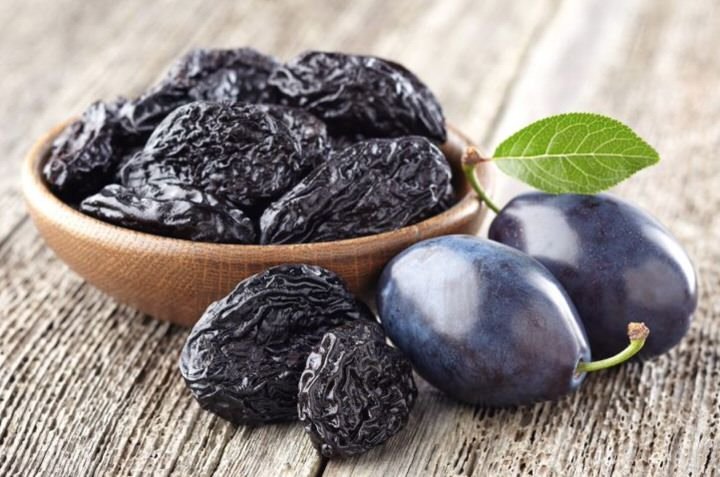Prunes are a nutritious and healthy food. Discover its most important benefits, properties and nutritional information of delicious dried or dried fruits.

The plum comes directly from the prunus tree, a species in the Rosaceae family. Its fruit is also known as drupe, which is characterized by having a fleshy interior with a seed that is surrounded by a woody endocarp. The plum tree had its origin in China millennia ago, although the most consumed today are of American origin.
Likewise, in Colombia they are known as “cantelana plum “ to which a festival is even dedicated in the Atlantic department where all kinds of ice cream, sweets and wine are prepared that have this fruit as the main ingredients.
Among the plums, there are those known as prunes that are characterized by having been subjected to a natural drying process, which centuries ago was carried out by exposing them directly to the sun’s rays. Although at present, faster and more artificial techniques are carried out that basically consist of introducing the plums into large ovens.
Main properties of prunes
It should be noted that after this dehydration process, the prune continues to maintain all its properties intact and it is even possible that these are enhanced. Are you curious to know what they are? Well, from Natursan we are going to ask you to put the five senses in the following lines.
Inexhaustible source of energy
During the dehydration process, the plum dries up resulting in a higher concentration of glucose. Thanks to this, this fruit is an inexhaustible source of carbohydrates and glucose that can be an energy boost that is sometimes so necessary for intense physical activity. In this way, the prune is a great ally for elite athletes or simply to regain energy after playing sports.
Very rich in fiber
Prunes are estimated to be five times richer in fiber than conventional prunes. And you know what this means, right? Well, this fruit is very beneficial for our intestinal flora.
For this reason, it should be consumed in high doses for all those who have problems going to the bathroom and suffer at the same time in the form of occasional constipation or diarrhea.
High magnesium content
Inside the prunes there is a high concentration of magnesium, an element that is essential for the proper development of our muscles.
Likewise, this compound acts as a powerful natural antioxidant that in the long run will prevent the release of free radicals, those toxins that are so harmful to our health. This will also prevent us from suffering other more serious diseases such as hypertension or even cancer.
They have bactericidal properties
Plums are also characterized by favoring the breakdown of all unsaturated fats from meats. In this way, it is possible to get rid of its ingredients while at the same time enhancing its flavor and giving it a much smoother texture.
What is the best way to eat prunes?
We will proceed to close this article to tell you the best ways that exist to take prunes. And you will see how you have available a wide range of possibilities at your fingertips.
- In the form of a puree. We can always crush the prunes to obtain a compote or puree that we can spread on a slice of whole wheat bread.
- In a juice. You also have the option of creating a prune juice that will be very beneficial for treating diarrhea or constipation.
- Completely dehydrated. In this way they will be easier to transport, something that will make them easier to take when going out to play sports.
Nutrition facts for prunes
As we indicated at the beginning, one of the main issues or nutritional values of dried or dried fruits is that during the drying process their water content is reduced, increasing the presence of simple carbohydrates, as well as their content is higher. Nutritional.
Thus, for example, in the case of prunes, they stand out for being especially rich in provitamin A (which has the advantage of becoming vitamin A, essential for vision), vitamin B3 (intervenes in different phases of metabolism and helps to take better advantage of carbohydrates), and vitamin C (although this is usually lost to a greater extent during drying).
It also provides minerals, such as potassium (helps in the transmission of the nerve impulse), magnesium (improves the proper functioning of the immune system) and iron.
Having said that, below we indicate the nutritional contribution of prunes per 100 grams:
- Energy: 164 kcal.
- Carbohydrates: 40 gr.
- Proteins: 2.4 gr.
- Total fat: 0.5 gr.
- Fiber: 16 gr.
- Vitamins: provitamin A (95 mcg), B3 (1.7 mg), vitamin C (traces).
- Minerals: potassium (720 mg), calcium (32 mg), iron (2.5 mg), magnesium (34 mg).
Therefore, prunes can become an ideal option when we need an extra supply of quick energy, thanks to its very high content of sugars (simple carbohydrates). For this reason, its consumption is recommended in athletes, when long-term intense physical exercise is practiced, being recommended to athletes, hikers and mountaineers in general.
And also, thanks to its contribution in fiber, its regular consumption helps to improve constipation, while helping to reduce high cholesterol levels.































